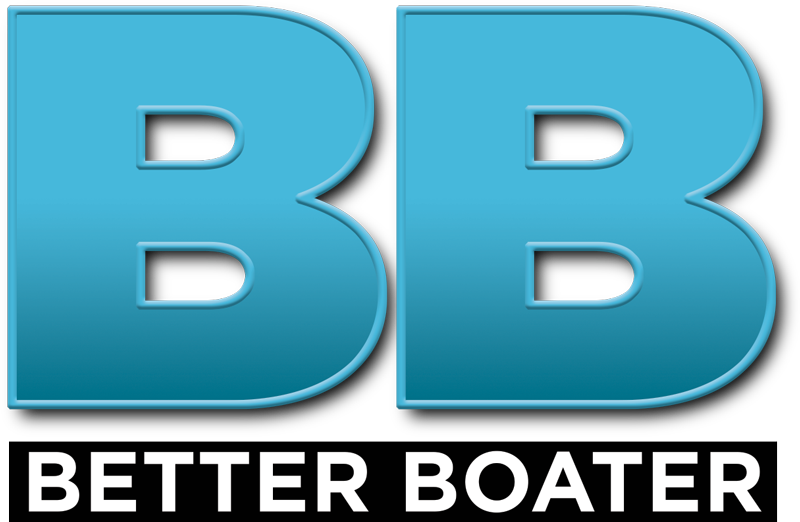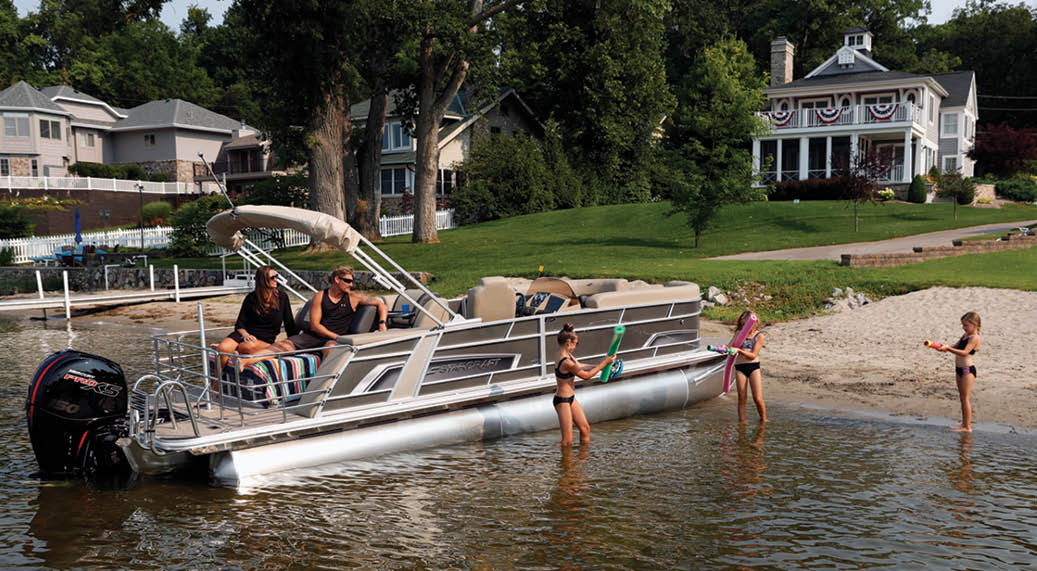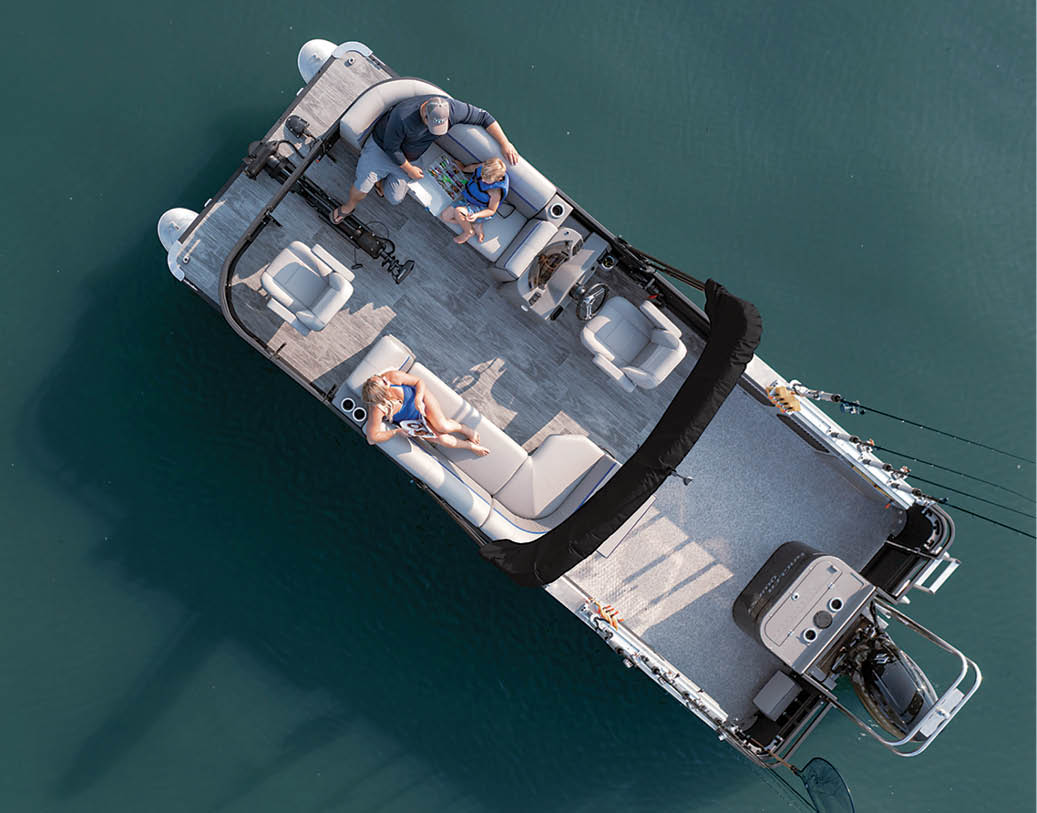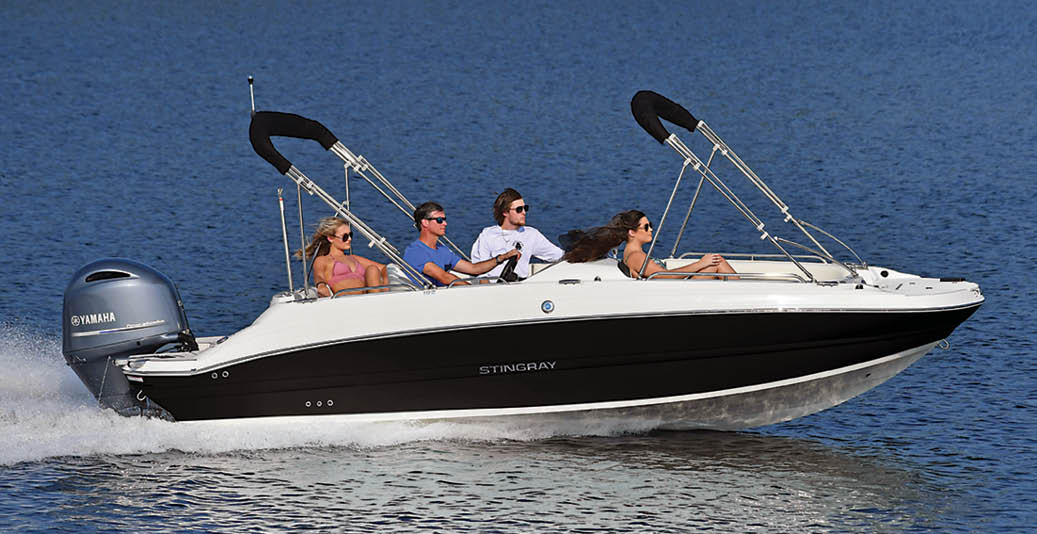
Q#1: What kind of boat should I buy?
If you’re interested in any new boat at all, you’re clearly interested in a pontoon or deck boat if you’re reading this magazine, but this question addresses what segment of vessels you’re looking for: entry-level, high-end, performance, fishing, etc.
Q#2A: What am I interested in?
This is the lifestyle question, as there are boats designed for specific walks of life. What kinds of things will you be using your boat to do? What will you be using it for most? Do you fish? Do you want something fast? Would you dig something great for watersports (such as tubing, waterskiing, or wakeboarding)? Do you have family or friends who want to enjoy a nice day out on the lake? How about just getting out on the water and taking it easy? Which vessel fits your character?
Q#3: How will I use this boat?
Take a real close, sincere look at yourself. As you dream of how you’ll use the boat, but do so [thoughtfully], you may find that your dream won’t work for the reality you live in. If that’s the case, you’ll need to make a compromise. That doesn’t mean surrendering your dreams of setting new performance records, but you simply need a vessel that makes more logical sense for your circumstances.

How close are you to the nearest body of water? If you live on or near a lake or river, you may have a ton of time to use the vessel. If you have a multi-hour drive one way to get to the water though, it may be harder to find the time to get the boat out.
Q#5: How often will I use it?
Knowing how often you’ll be able to use your boat is fundamental to knowing where you stand in possibly getting one. Factors to consider include the distance to the nearest body of water, the local climate, and how often your family and/or friends will want to use it. Many of us have bought clothes we only end up wearing a couple of times during the year. You may end up making that same mistake on a much larger scale if you don’t think the boat usage question through.
Q#6: Who will use the boat?
Are you by yourself, just eager to show off for others, or want to meet others out on the water? Or do you have other family and friends who’ll want to make use of your vessel?
Do you have your own dock? Is there a local marina where you can moor it during the summer? Is your garage big enough to store the boat on the trailer? If not, do you have enough space in your driveway to keep it out of the way of other vehicles? Can you perhaps rent storage to protect it from the harmful winter weather?
Q#8: What should I expect it to cost?
At bare minimum, you’ll end up spending $40,000-$50,000, but this is of course a conservative estimate. Keep in mind the outboard alone is going to cost anywhere from $4,000 to $40,000 and up depending on engine size and power. Plus, you have ownership costs to endure, too. They include, but aren’t limited to, mooring fees, fuel, insurance, and routine maintenance. As a rule of thumb, each year you should expect paying around five to 10 percent of the vessel’s total cost. Owning a boat is not cheap, so make sure the well is deep enough to cover this new hobby.
Q#9: How much am I willing to pay?
This goes in tandem with the previous question. Once you have a ballpark idea of how much it’ll all cost, you’ll need to set your budget and consequently adjust your prospects.

Q#10: How much horsepower do I need?
This builds on the earlier question of how you plan to use the boat. If you just want to chill on the water, you’re probably looking at outboards between 50 and 115hp. If you want to go fishing, you may want to consider adding a trolling motor. If you’re all performance-minded, though, you’ll want to get at least a 175hp engine. However, not all boats are the same. Some can get going faster than others with the same engine power, so do some research and see if you really need high-horsepower motors after all.
Q#11: How many engines should I get?
This goes with the previous question. Probably just one, unless you really love speed and can’t get enough of it. A number of boats are compatible with two outboards if desired, and we’ve even tested triple-powerhouse pontoons before.
Q#12: What kind of engine should I get?
Outboard engine or sterndrive? Most pontoons utilize an outboard, but sterndrives aren’t out of the question for them. Deck boats can utilize both. Sterndrives are pricier, but they save you the rear view blind spot, and they open up space for a sunpad, swim deck, or simply more deck in general.
Again, you need to decide what you’ll use your boat for and plan accordingly. It’s understandable that you’d want a certain size, but just because you [could] get a giant boat doesn’t mean you [should]. If you have a big family or a lot of friends to entertain, then a 26-footer or larger may be your best bet. But if it’s just you and your significant other, an 18- or 20-footer will be plenty for what you need.
Q#14: How much weight can the boat handle?
All pontoons and deck boats have a plate or sticker stamped in them somewhere that displays the maximum weight and occupant capacities. Although it can vary somewhat with different engine horsepower ratings, as a safety measure, this is the boat’s official capacity and is not to be exceeded.

You’ll definitely need to make sure you have a properly equipped vehicle to tow your boat around. Even though you [can] throw a hitch on any vehicle, you need to check your vehicle’s weight rating. A Honda Civic, for example, will NOT be able to safely tow a small deck boat; that’s a job for something more like a Honda Pilot. When retrieving the vessel on the ramp after a period on the water, it helps to be equipped with four- or all-wheel drive for better traction. With that, you’ll also need to factor in the weight of the trailer and anything you’ll have in the boat when you get out to the water.
Q#16: What comes with the boat?
Knowing what bells and whistles come with your boat is important, but even more important is the trailer, as not all purchases include trailers. Most times they do, but it’s better to know for sure, because it could end up being another surprise cost.
Q#17: Can I have a test drive?
This is the one way to find out whether or not all these things you’ve been reading about this boat are true. It’s also the only way to get a taste of the vessel’s unique “character.”
Q#18: What does the warranty cover?
If you acquired a brand-new truck from the dealer and the stereo fell on its face a few weeks later, that should be covered under the warranty. It may not be that way for a boat, though. Make sure to get the full details of your warranty coverage in writing.
That’s it. We’ve done our best to help you get moving on your boat hunt by arming you with our information. Now it’s your turn to make the decision you feel is right for you. We’re in the prime time for boat hunting, so get out to the early boat shows and start searchin’ around!